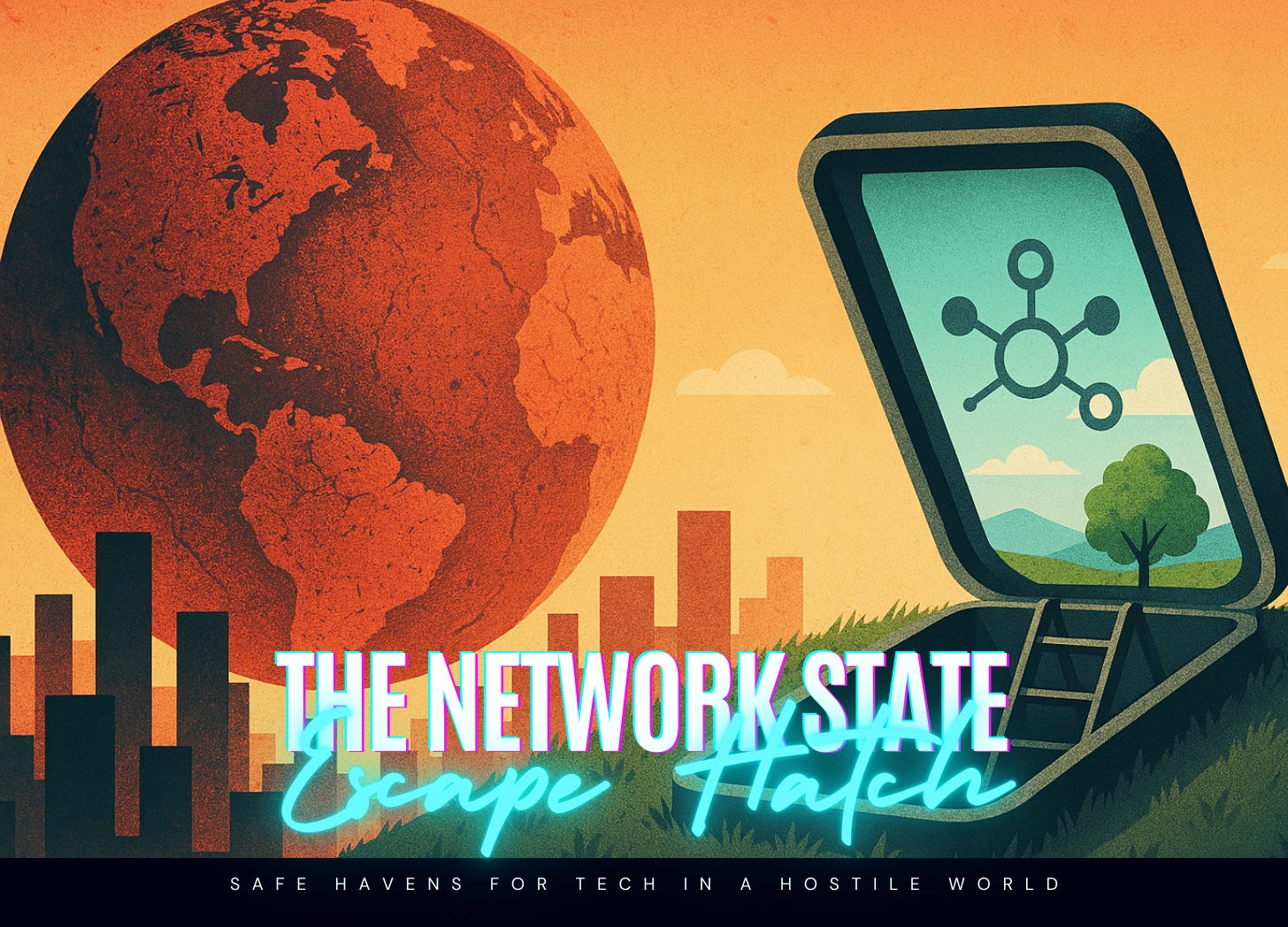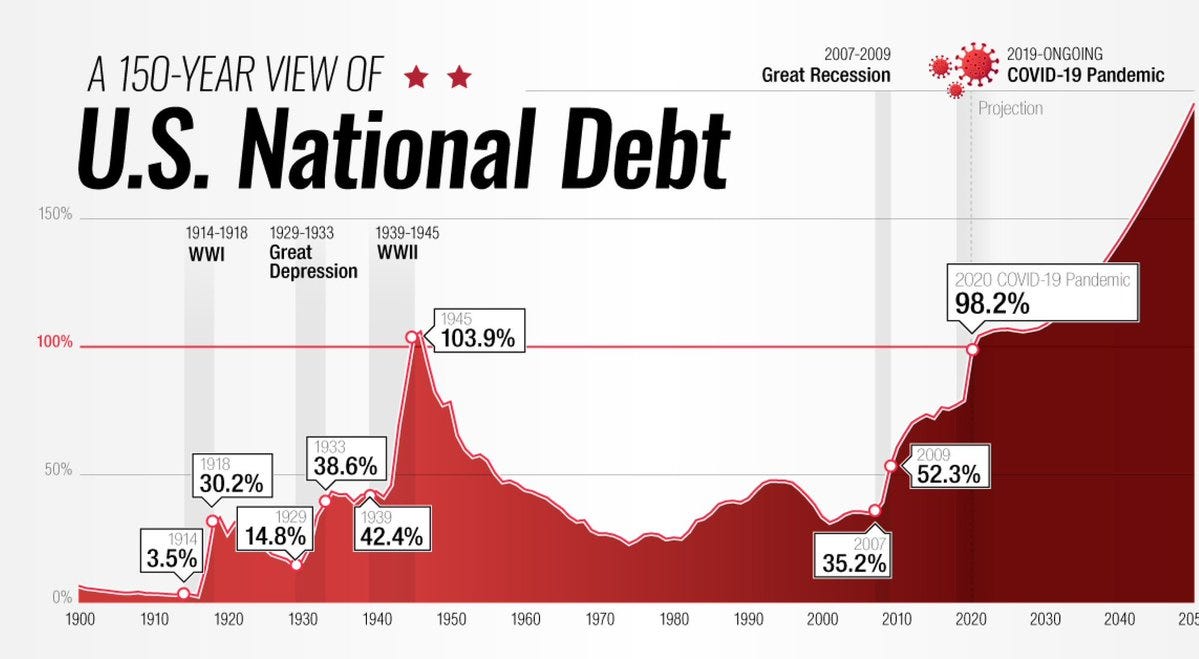The Network State Escape Hatch
Safe Havens for Tech in a Hostile World
True innovation happens in democracies because freedom is an essential aspect of creativity. One could argue that constraints amplify creativity as well, and while there's no denying that, if you look at all of humanity's revolutionary inventions, almost all of them happened at democracies.
From the invention of the printing press in Renaissance Europe to concrete in the Roman Empire, to the Internet and computing revolutions in Silicon Valley, democracies have always fostered innovation.
So, it's arguably a good thing that the President of the United States has been known as the leader of the free world, and the United States, for a long time, has cared not just for its citizens, but for those beyond its borders - from generously offering military support to delivering continuous humanitarian aid to other nations at times of crisis, to even mediating conflict among neighbouring states.
However, as is normal with the passage of time, great empires lose their power and new ones take hold.
The unipolar world order, once anchored by U.S. leadership, is slowly fracturing today. Historical parallels such as the decline of the Roman Empire, or more recently- the British Empire post-WWII which reshaped global alliances, and today, rising multipolarity and inward-looking policies (e.g., trade protectionism, regulatory fragmentation) threaten the collaborative frameworks that enabled past innovations.
"De-globalisation" is what its being called, and the Internet: the enabler of a natively global cyberspace which once brought prosperity and connection, is actively getting worse in the face of it all- where algorithms concentrate echo chambers and division and hate thrives faster than ever before.
As the trump presidency continues, it looks more likely that we're headed for times as volatile as ever. We're already seeing a tariff war, but real wars haven't stopped either.
And the US now choosing to recede from the global stage has major consequences.
This quick vacuum of a global superpower may just create a race for global dominance, and if that dominance is challenged, we're headed for some difficult times. America itself, has a bigger debt problem than most realize, and things are worse now than they’ve been since 2008.
One solution, at least for those in nations affected by this changing dynamic, is to move to network states. These are states where people are ideologically aligned around shared goals, actively leverage technology in governance, crypto-friendly, and in a world that's seemingly very unstable, it may just be the answer you’re looking for.
You can start your own network state, and there's a free book which teaches you exactly how to do that.
But starting one from scratch isn't easy.
This essay will focus on why starting one isn't easy, and then highlight one network state that's clearly starting to work.
II.
Because Network States are a relatively new concept, it can be the case that they're easy to spin up some time in the future. Just like we can start websites, companies and currencies today with the push of a button, starting a network state could be simple and easy in the future.
However, as I've spent more time thinking about this, I've come to realise that, at least for now, there are two undeniable variables for a network states to be successful -> Time and Numbers.
Time is a necessary variable because Network States intimately depend on a community of proactive people, and relationships take time to deepen and evolve. Just having shared interests is often not enough, but shared values and principles are what matter the most.
A network state doesn't just start as a network state from Day 1 (although, like I said, that can be the case in the future), but it has to start small.
It has to start with a small group of ideologically aligned people, and they may not even know they’re a “network state”, just a group of people deciding to live in one geographical location by choice, is enough as a good beginning. Of course, it can start digital-first where it’s a group chat or a discord server, but it has to translate to land soon.
Once it's a society or school, it's effectively a service - a service that provides both value and community, but more importantly, requires the careful coordination and intent of all its participants to work.
As this service scales and becomes more dominant, it slowly starts to resemble a state. Unlike a tech product where you can quickly test a MVP, a network state's MVP is probably a group chat of people willing to have IRL meet-ups. The second stage to really test product-market fit is to have month-long retreats with the same people, and see how many care to show up. Initiatives like vibe camp show a version of this working.
Because the core product of a founder-led network state is still the community of people within it, a group chat with the ambitions of being a nation must have to prove that people are willing to meet-up with each other, they must be willing to contribute in order to fund a number of such meet-ups, they must be willing to relocate to a specific location for a short duration of time first, and eventually for a long duration of time later.
The Network State also can't freely admit anyone - as it must ensure that each new addition is ideologically or at least culturally aligned with the values and principles of the state. This means even from the beginning as you're starting out, you have to keep the quality filter high enough such that the 100th member won't look at the other 99 members and decide not to join.
All this means that you just can't decide to start a network state today, and launch tomorrow. However, that's also not a rule. While a network state started by Mr. Beast would certainly fail because of a lack of ideological alignment, a network state by Pieter Levels for independent solo founders, or John Carmack for VR startup founders and tinkerers would certainly work. Maybe Mr. Beast's could also work as the number of influencers is rapidly growing, and surely, they're ideologically aligned on capturing your attention by any means, so that's an important filter.
But hopefully, if you're not a famous personality, time is still going to be one of the things you have to optimise for, so it's worth starting early, and while you do, you'll get better at filtering out the people that you don't want, so that you can eventually build a country with people that you do.
You also have to make sure you don’t upset the government who owns the land that allowed you to create the zone, which, at least one promising Network State has already done.
The other most important variable for a Network State is the number of people.
III.
If I tell you I wake up every morning and worship the Sun, you'll call me a lunatic. But the Sun has been worshipped for thousands of years in several cultures. It's not as popular now, but people still wake up tomorrow to pray to the Gods of their own religions. The only reason you consider that as a valid practice, but not my Sun-worship, is because I don't have the numbers on my side.
If there were billions of Sun worshippers on Earth, suddenly, you wouldn't feel so great about critiquing my morning routine. You wouldn't want to offend or hurt the religious sentiments of billions, right?
So, there is a profound strength in numbers which is undeniable, and yet, it is often underrated. For Network States, even though I can make the argument that it is not the quantity of citizens which matter, but the quality of citizens, at the end of the day, it is the number of people in a network state that will serve as the catalyst to legitimacy and recognition.
Because if you think about it, Jeff Bezos, Elon Musk & Mark Zuckerberg on an island doesn't mean much. Yes, the collective net worth of that "country" of 3 is over 800B dollars, greater than the GDP of the majority of the countries (Only 21 countries have a GDP higher than this), but that island won't be considered a real country. But, if just three people moved their companies to the island, forcing all the people who worked there to join them, suddenly, it's a country with hundreds of thousands of people.
At that point, you have to take them seriously, so it's inevitable that the network state that successfully scales by attracting more people, will eventually be recognised as a real nation.
The only question is- when will that happen? Because if the condition of the world is anything to go by, we need one alternative very soon.
Luckily, there seems to be one answer.
IV.
Balaji Srinivasan, who coined the word "Network State" and wrote the book about it, has also been known for his terrifying, yet accurate predictions.
One of his main predictions is that the American empire is in decline, and I think, that is the whole reason behind why we would eventually need network states.
He has spent the last few years popularising the idea, holding Network State conferences, funding those trying to build Network States, but it increasingly seems like he's following his own playbook and also creating a network state himself.
The first version received 4,000+ applications but only had capacity for 128+ members. The second version, "Network School" has more capacity, and you can still apply to visit, and check it out.
I think the third or fourth version of this will be a perpetually running city, and within ten years, it’ll be officially recognised as a nation state. Even before the official recognition, as word starts to spread about how great the experience of conducting business and standards of living are, and if at least a few companies founded there start making waves, they'll gain the attention of the broader public much sooner.
By then, this network state should hopefully have nodes through the world, so even if you can't travel to one, you'll hopefully have one near you. If the nation you're in is especially hostile to technology and progress, which can be direct hostility by demonising innovation and capitalism, or indirect hostility by plain old bureaucracy and incompetence, I'm sure the Network State that's shaping up right now will be a safe haven for you.
But it can't happen overnight. It needs time, but time is slowly running out.




